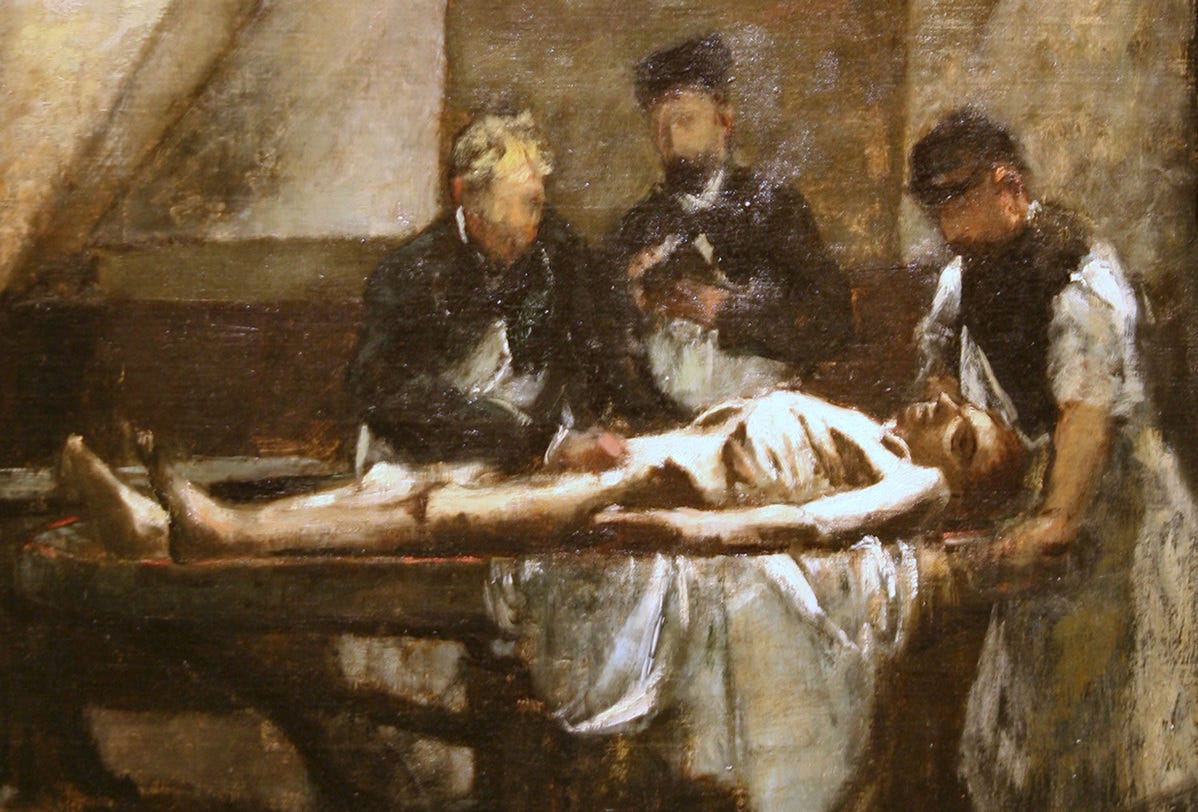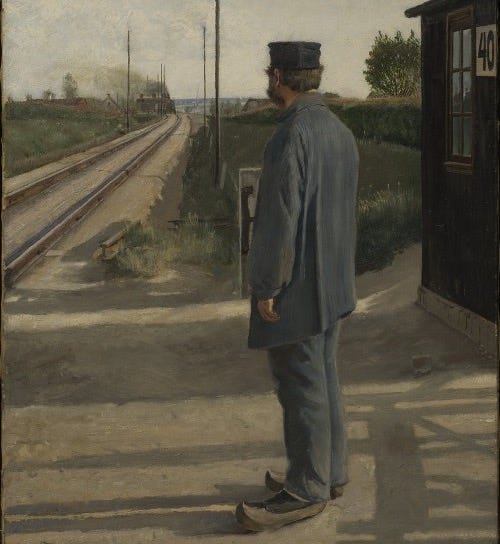A while back, I realized that wherever I go, I come across Notes from Underground in one form or another.
When I was struggling to catch a slippery piece of salmon with chopsticks during an omakase dinner, the man to my right—after finding out I was Russian—felt compelled to share that he had just finished reading Notes from Underground.
I was like: “Ha, that’s great!” (I have never heard of this book in my life.)
Came out it was a book by Dostoevsky.
I’m hardly the role model, when it comes to this man. I’ve only read Crime and Punishment, because it was assigned to me—White Nights, because I saw an atmospheric TikTok drenched in the doomed charm of Saint Petersburg, and Idiot, because of its promising title. Poor and stranded The Brothers Karamazovs are still tucked on my shelf, mutely watching me pick up every book except of them.
I really wish I had time to get into Dostoevsky deeply, because wherever I go, Fyodor Michailovich is watching me accusatory from underneath his bushy eyebrows.
But until then, I’ll take the liberty to talk about the books that once have altered my brain chemistry—a term used online to signify something that have split your life into “before” and “after.”
They’re not necessarily the kind of books you could use to pick up girls (although you could easily pick up me), but the kind that will not only make you seem niche, edgy, and knowledgeable, but also bring you deep literary pleasure.
1. The unfortunate reality of being a medical student in the early 20th century, Russia.
The only notes I’ve read so far were the notes by one certain doctor—specifically, Bulgakov’s short story collection A Young Doctor’s Notebook and the story Morphine—which didn’t make it into the collection but is, essentially, about the same guy.
At its core, the book is filled with the confessions of a young doctor, fresh out of med-school, who was sent to a regional hospital to be the chief medical officer in a stranded, lost-on-the-map village on the outskirts of the country. They really said—best way to learn is through practice.
This clashing of concepts—where the clean and white, reeking with the sanitary smell of alkaline, meets the rotten, the old and the rusty of the Russian glubinka, a tucked away hinterland with log cabins, far from the comforts of civilization (although, still questionable, its 1917 we are talking about) is an alluring theme that adds depth to the story. And, of course, morphine plays a role in the young doctor’s fate.
I’m not guilty of anything,” I thought stubbornly and painfully. “I have a diploma, I have fifteen A’s. I told them back in that big city that I wanted to go as a second doctor. But no—they just smiled and said, ‘You’ll get the hang of it.’ Well, here’s your ‘getting the hang of it.’ And what if they bring in a hernia case? Tell me, how exactly am I supposed to ‘get the hang of’ that?
Nevertheless, the tone of the stories is hardly heavy. It’s Bulgakov’s signature style, filled with witty sarcasm, whimsical characters, and vivid dialogue.
(Also, there is a BBC adaptation with Daniel Radcliffe).
2. The wanderings of a misunderstood genius.
Moscow-Petushki, also published in English as Moscow to the End of the Line is a postmodern prose poem, a tragedy, a comedy, an ode to liquor—filled with references to the Gospel, modern philosophy, and the Romans.
It’s a story of an alcoholic for some; for others, it’s a retelling of the New Testament plot, with the main character, Venechka, as Jesus. It’s really both.
His never-ending monologues are filled with uncensored language and swearing, which drown in occasional, strikingly deep thoughts—ramblings, conversations with God and angels in that lonely train wagon—that make you stop reading and just…
There was also Hegel. I remember that very well: there was Hegel. He said: “There are no differences except for the difference in degree between different degrees and the absence of difference.” Which, if translated into proper language, means: 'Who doesn’t drink these days?' Do we have anything to drink, Pyotr?
When I read this in high school, I believe I fell in love with literature all over again. And the intertextuality, prevalent in works of that era, became my favorite literature device.
3. The fever dream of one or a hundred summers.
Sasha Sokolov’s School for Fools is a fever dream of a boy who seems to have a split personality disorder. The novel shifts between his monologues and dialogues between the two entities of his personality. They meditate on their summers at the dacha—a term for a country house where city dwellers escape the overstimulating clatter of urban life.
As the book progresses, it makes less and less sense. Names change, people disappear, and sudden references to Da Vinci—and, yet again, the Bible—appear. It’s unclear what time of day it is, how many years have passed since the last sentence, or even who’s speaking, etc., etc.
I wrote a whole review of School for Fools—you can read it here.
Meanwhile, this quote can help you visualize Sokolov’s style of narration:
… sleep sleep branch permeated with creosote in the morning wake up and bloom later finish blooming pour your petals in the eyes of the signal posts and dancing in the rhythm of your wooden heart laugh at train stations sell yourself to those who pass by or depart cry and shout getting naked in the mirrored compartments what’s your name I’m called Vetka I’m a branch of acacia I’m a branch of the railroad.
4. The chronicles of the Soviet émigré.
Eduard Limonov is a character on his own. Look him up. No-one knows how much from the book I’m going to talk about is based on real events. Probably, most of it. But we can never know for sure.
It’s Me Eddie1 was written in the then-popular genre of confessional writing. The author, using the first person and his own name, basically tells us the story of Eddie, who immigrated to the States during the third wave of immigration—along with some other prominent writers like Brodsky, Dovlatov, etc, etc.
What made this book stand out from the crowd were the explicit scenes, the language, the fuss it raised at the Union, the things he said about his homeland—the chaos, the crudeness, the confrontation. I mean, it opens with Limonov sitting naked on a balcony, eating Russian soup, and saying: “I live at your expense. You pay taxes, and I don't do a fucking thing.”
But my favorite quote is this one:
“We talked about how few people in America go in the water and swim. Most just sit on the beach, or go in up to their knees and splash, whereas in the USSR everyone tries to see who can swim farthest, and overzealous swimmers are fished out by the lifeboats and forced to swim ashore.”
I’ll get back to you when I read Notes from Underground. Meanwhile, I’d love your thoughts or recommendations!
I’m not sure if you can buy this book in translation now, but if you’re interested—I have an e-book version!









